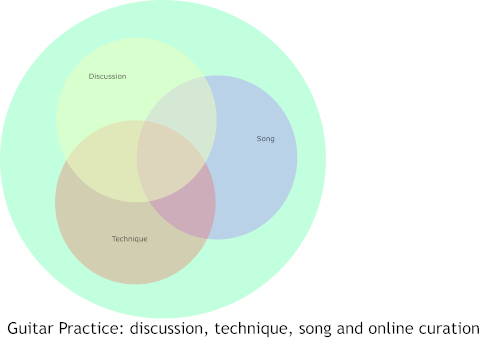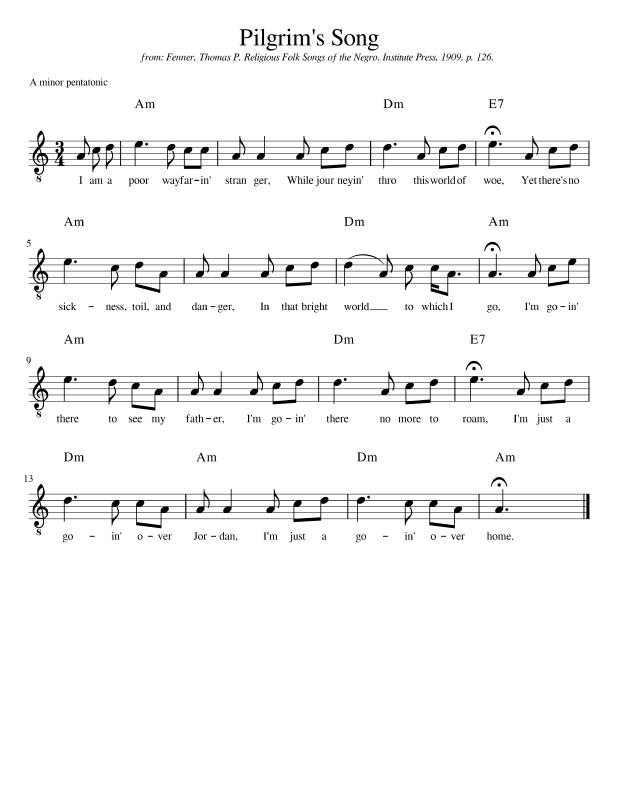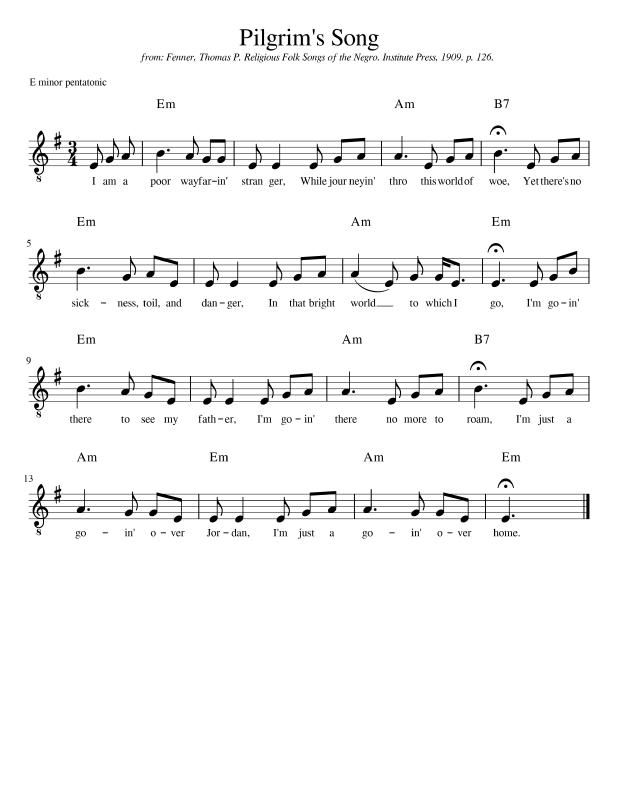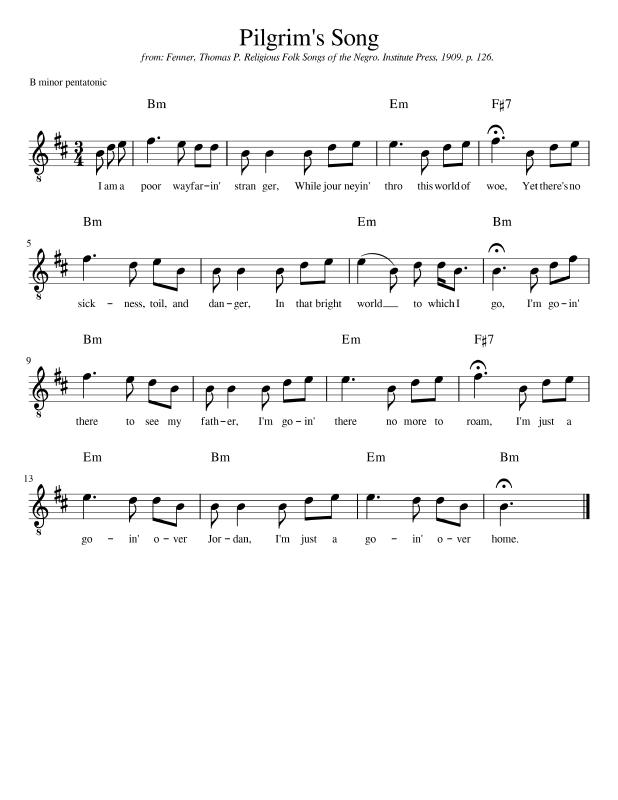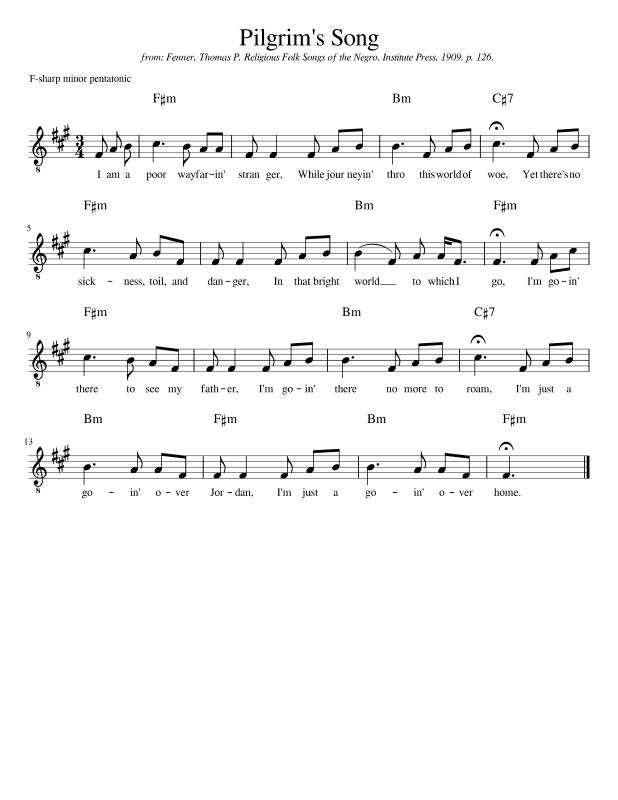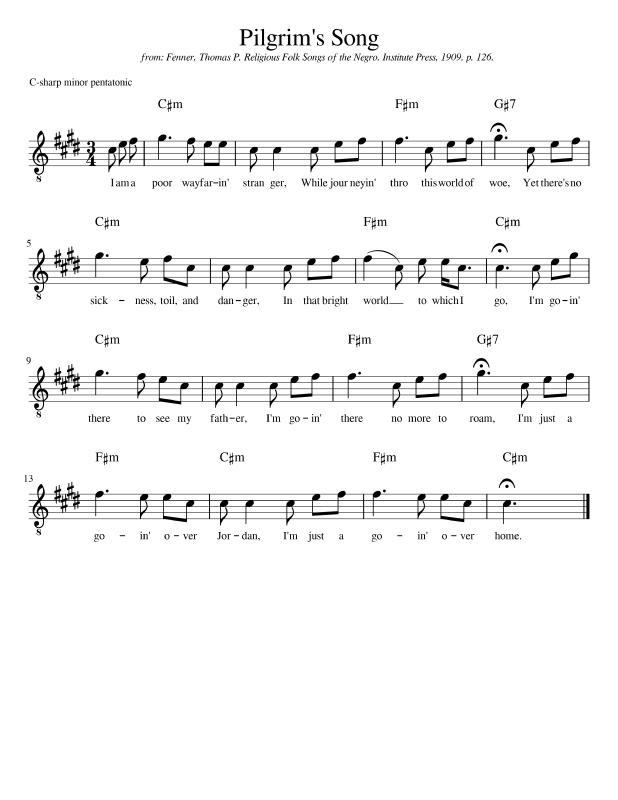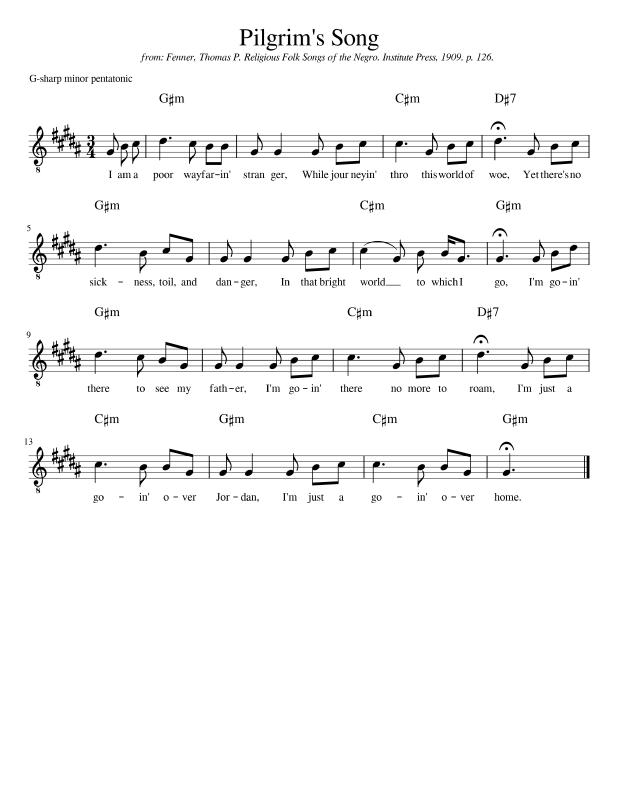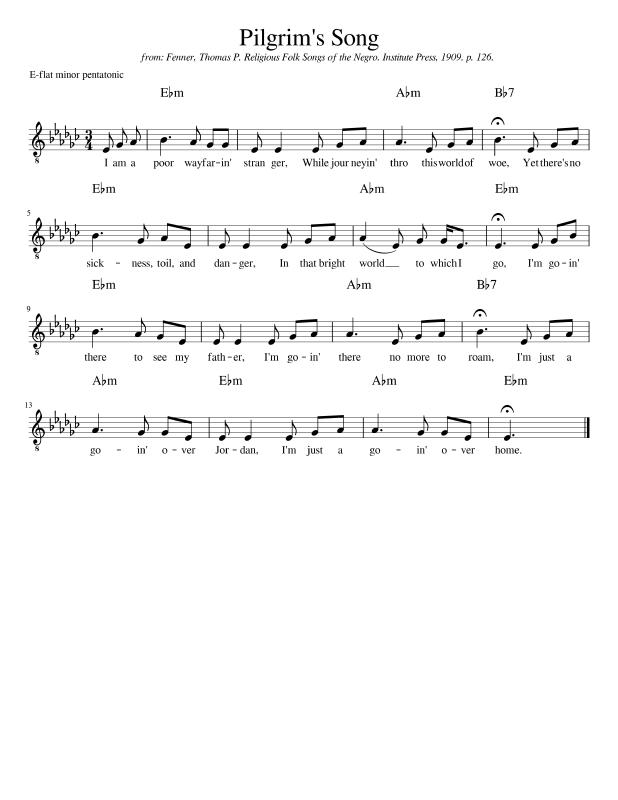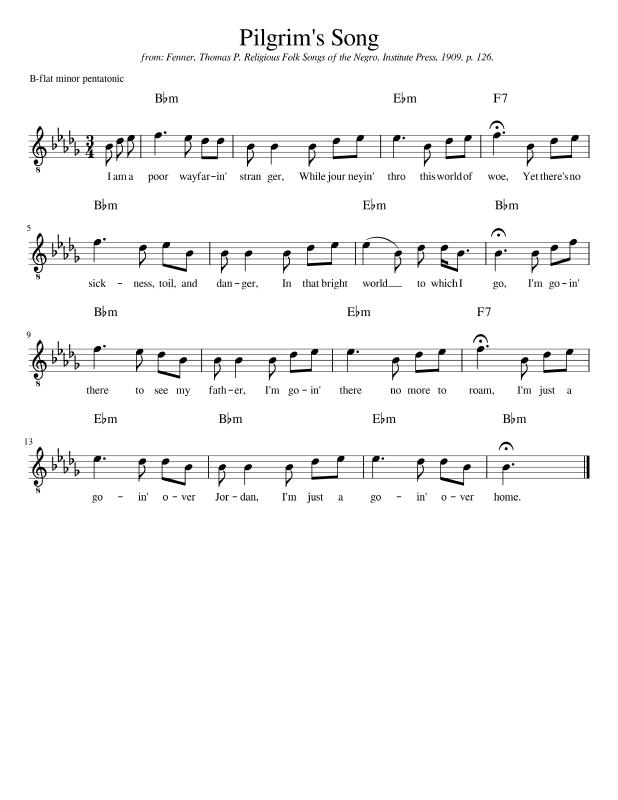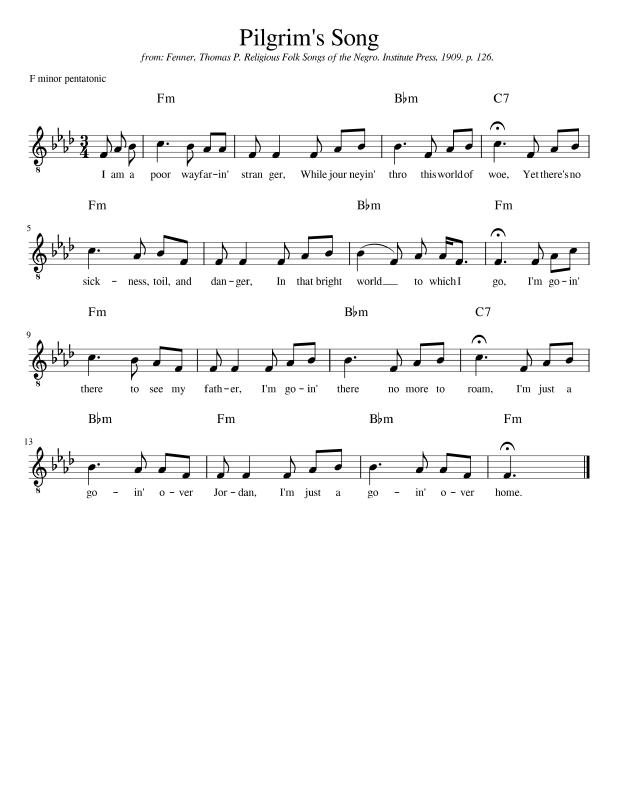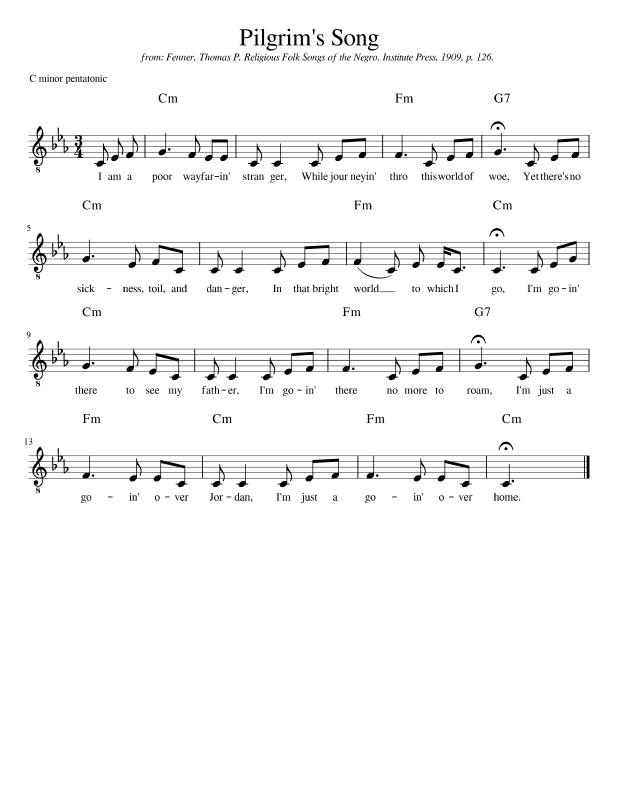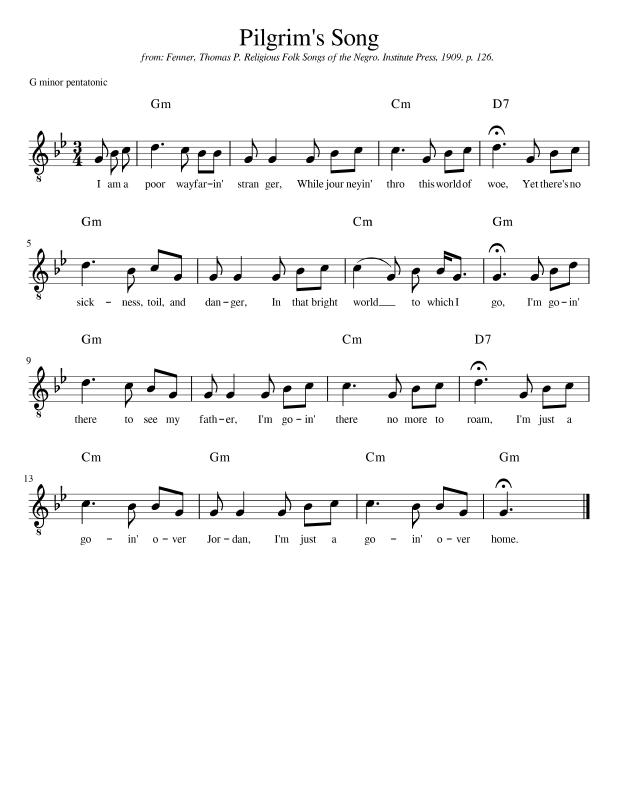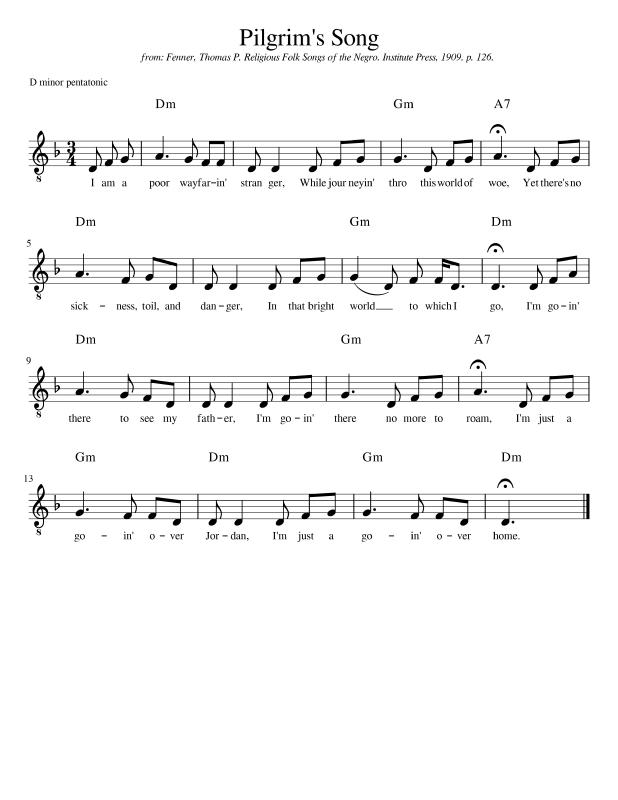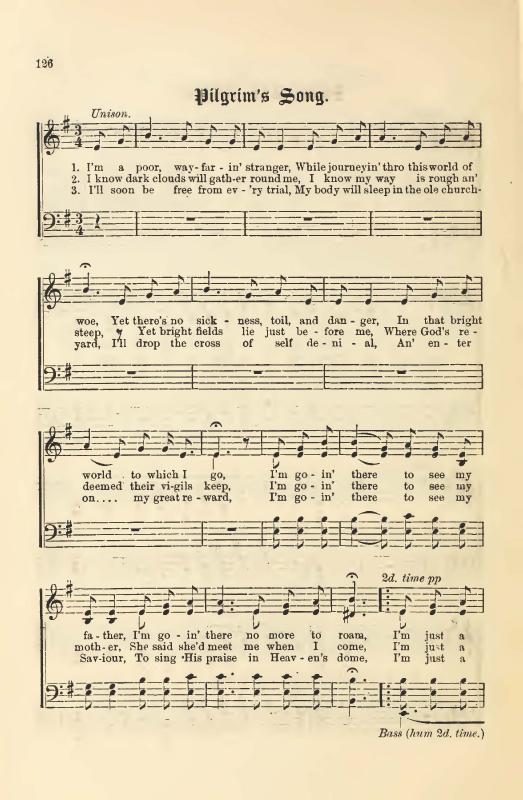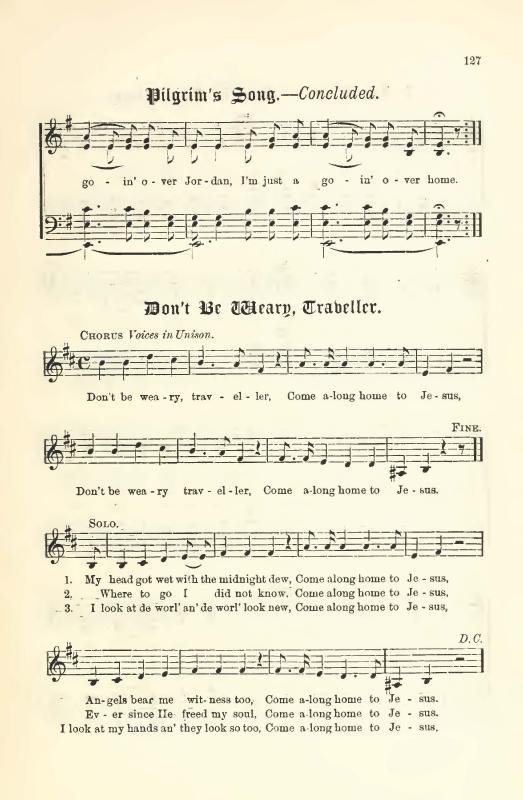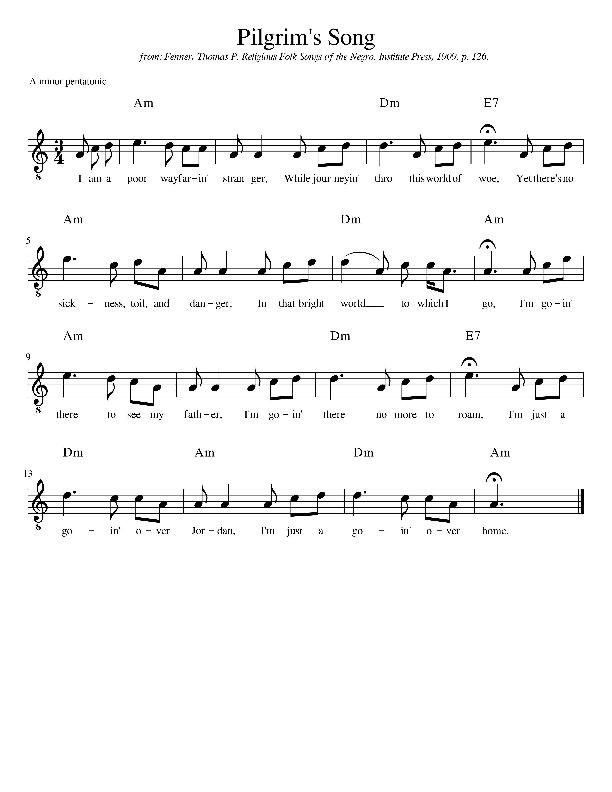Pilgrim's-Song_from_Religious-Folk-Songs-of-the-Negro
Dublin Core
Title
Pilgrim's-Song_from_Religious-Folk-Songs-of-the-Negro
Subject
Song Lead Sheet
Description
The Pilgrim's Song
from: Fenner, Thomas, P. Religious Folk Songs of the Negro. Institute Press, 1909. pp.126-127
Lead sheet with chords in twelve keys.
The title and introductions of Fenner's book make me very uncomfortable.
However, both the introductions say something important. They say that many people weren't supportive of choirs like Fenner's. To that issue I say: Fenner and Morton, my experience is that people are reluctant to support you when you call them, “ignorant," and their melodies, "rude."
Reconstruction was not a harmonious time for many blacks. Many were struggling as sharecroppers. They were quite literally poor and wayfaring. Maybe they were struggling so much to support themselves that they couldn't be supportive of anything else?
I'm worried today that I'm doing something similar to Fenner. I'm harmonizing melodies.
However, I do not find the melodies, “rude.” The pentatonic scale is ubiquitous in music from every continent. The notes of the melody of “The Pilgrim's Song” are all from the minor-pentationic scale. The song may be basic and repetitious, but music like that is better for anyone to participate with. A camp meeting wouldn't be a camp meeting if people had to read SATB charts.
When I learned music theory, I learned the chromatic 12 note scale first, then the major/minor scales, then the pentatonic scale. But musicologists believe that music evolved in the opposite direction. People first sang in pentatonic scales, then seven note scales, and then added chromaticism to compositions.
On the guitar, the minor pentatonic scale has a “box” like pattern. Box pattern scales, though criticized by many guitarists, are a staple of my playing.
I began studying Spirituals because I was fascinated by their sound and history, but I soon learned that studying them can be a very effective way of learning music. Fundamental concepts like call and response can help people learn about song forms, and having public domain access to hundreds of songs can vastly help anyone learning music. I don't think these melodies are, “rude.” I think if a musician studies fifty Spirituals, they are well on their way to being able to play almost any music made today. It's maybe hyperbole for me to say such. I haven't studied fifty Spirituals, myself, though many genres branch from Spirituals.
*I added an eighth note to the pickup at the beginning of this song. It wasn't to remove the contraction, “I'm,” and replace it with “I am.” I added the eighth note so the beginning rhythm, “and three and one,” is the same as the, “and three and one” measures that happen throughout the song. I think hearing that, “and three and one” clearly at the beginning of the song helps with understanding the rhythm better throughout the song.
I didn't read Fenner's chord harmonies. I'm terrible at reading bass-clef. I added chords based on my understanding of the minor-pentatonic scale. The dom7 chords can be replaced with simple major triads. The third of those dom7 chords puts the song briefly in the harmonic minor mode for those measures.
-D.J. Ellis
from: Fenner, Thomas, P. Religious Folk Songs of the Negro. Institute Press, 1909. pp.126-127
Lead sheet with chords in twelve keys.
The title and introductions of Fenner's book make me very uncomfortable.
However, both the introductions say something important. They say that many people weren't supportive of choirs like Fenner's. To that issue I say: Fenner and Morton, my experience is that people are reluctant to support you when you call them, “ignorant," and their melodies, "rude."
Reconstruction was not a harmonious time for many blacks. Many were struggling as sharecroppers. They were quite literally poor and wayfaring. Maybe they were struggling so much to support themselves that they couldn't be supportive of anything else?
I'm worried today that I'm doing something similar to Fenner. I'm harmonizing melodies.
However, I do not find the melodies, “rude.” The pentatonic scale is ubiquitous in music from every continent. The notes of the melody of “The Pilgrim's Song” are all from the minor-pentationic scale. The song may be basic and repetitious, but music like that is better for anyone to participate with. A camp meeting wouldn't be a camp meeting if people had to read SATB charts.
When I learned music theory, I learned the chromatic 12 note scale first, then the major/minor scales, then the pentatonic scale. But musicologists believe that music evolved in the opposite direction. People first sang in pentatonic scales, then seven note scales, and then added chromaticism to compositions.
On the guitar, the minor pentatonic scale has a “box” like pattern. Box pattern scales, though criticized by many guitarists, are a staple of my playing.
I began studying Spirituals because I was fascinated by their sound and history, but I soon learned that studying them can be a very effective way of learning music. Fundamental concepts like call and response can help people learn about song forms, and having public domain access to hundreds of songs can vastly help anyone learning music. I don't think these melodies are, “rude.” I think if a musician studies fifty Spirituals, they are well on their way to being able to play almost any music made today. It's maybe hyperbole for me to say such. I haven't studied fifty Spirituals, myself, though many genres branch from Spirituals.
*I added an eighth note to the pickup at the beginning of this song. It wasn't to remove the contraction, “I'm,” and replace it with “I am.” I added the eighth note so the beginning rhythm, “and three and one,” is the same as the, “and three and one” measures that happen throughout the song. I think hearing that, “and three and one” clearly at the beginning of the song helps with understanding the rhythm better throughout the song.
I didn't read Fenner's chord harmonies. I'm terrible at reading bass-clef. I added chords based on my understanding of the minor-pentatonic scale. The dom7 chords can be replaced with simple major triads. The third of those dom7 chords puts the song briefly in the harmonic minor mode for those measures.
-D.J. Ellis
Creator
D.J. Ellis https://djellis.net/
Source
Fenner, Thomas, P. Religious Folk Songs of the Negro. Institute Press, 1909. pp.126-127
https://archive.org/details/religiousfolkson00fenn
https://archive.org/details/religiousfolkson00fenn
Date
2024-01-29
Format
.png 3060x3960
.jpeg 1962x3000
.mp3 128 kbps
.pdf letter size
.mid Midi
.jpeg 1962x3000
.mp3 128 kbps
.pdf letter size
.mid Midi
License
https://creativecommons.org/licenses/by/4.0/deed.en
Table Of Contents
song_from_Religious-Folk-Songs-of-the-Negro_Pilgrim's_Song_A-minor_lead_sheet.png
song_from_Religious-Folk-Songs-of-the-Negro_Pilgrim's_Song_E-minor_lead_sheet.png
song_from_Religious-Folk-Songs-of-the-Negro_Pilgrim's_Song_B-minor_lead_sheet.png
song_from_Religious-Folk-Songs-of-the-Negro_Pilgrim's_Song_F-sharp-minor_lead_sheet.png
song_from_Religious-Folk-Songs-of-the-Negro_Pilgrim's_Song_C-sharp-minor_lead_sheet.png
song_from_Religious-Folk-Songs-of-the-Negro_Pilgrim's_Song_G-sharp-minor_lead_sheet.png
song_from_Religious-Folk-Songs-of-the-Negro_Pilgrim's_Song_E-flat-minor_lead_sheet.png
song_from_Religious-Folk-Songs-of-the-Negro_Pilgrim's_Song_B-flat-minor_lead_sheet.png
song_from_Religious-Folk-Songs-of-the-Negro_Pilgrim's_Song_F-minor_lead_sheet.png
song_from_Religious-Folk-Songs-of-the-Negro_Pilgrim's_Song_C-minor_lead_sheet.png
song_from_Religious-Folk-Songs-of-the-Negro_Pilgrim's_Song_G-minor_lead_sheet.png
song_from_Religious-Folk-Songs-of-the-Negro_Pilgrim's_Song_D-minor_lead_sheet.png
from_Fenner-Thomas-P_Religious-Folk-Songs-of-the-Negro_Pilgrim's_Song_E-minor_Page_126.jpg
from_Fenner-Thomas-P_Religious-Folk-Songs-of-the-Negro_Pilgrim's_Song_E-minor_Page_127.jpg
song_from_Religious-Folk-Songs-of-the-Negro_Pilgrim's_Song_A-minor_lead_sheet.mp3
song_from_Religious-Folk-Songs-of-the-Negro_Pilgrim's_Song_A-minor_lead_sheet.mid
Pilgrim's-Song_from_Religious-Folk-Songs-of-the-Negro.pdf
song_from_Religious-Folk-Songs-of-the-Negro_Pilgrim's_Song_E-minor_lead_sheet.png
song_from_Religious-Folk-Songs-of-the-Negro_Pilgrim's_Song_B-minor_lead_sheet.png
song_from_Religious-Folk-Songs-of-the-Negro_Pilgrim's_Song_F-sharp-minor_lead_sheet.png
song_from_Religious-Folk-Songs-of-the-Negro_Pilgrim's_Song_C-sharp-minor_lead_sheet.png
song_from_Religious-Folk-Songs-of-the-Negro_Pilgrim's_Song_G-sharp-minor_lead_sheet.png
song_from_Religious-Folk-Songs-of-the-Negro_Pilgrim's_Song_E-flat-minor_lead_sheet.png
song_from_Religious-Folk-Songs-of-the-Negro_Pilgrim's_Song_B-flat-minor_lead_sheet.png
song_from_Religious-Folk-Songs-of-the-Negro_Pilgrim's_Song_F-minor_lead_sheet.png
song_from_Religious-Folk-Songs-of-the-Negro_Pilgrim's_Song_C-minor_lead_sheet.png
song_from_Religious-Folk-Songs-of-the-Negro_Pilgrim's_Song_G-minor_lead_sheet.png
song_from_Religious-Folk-Songs-of-the-Negro_Pilgrim's_Song_D-minor_lead_sheet.png
from_Fenner-Thomas-P_Religious-Folk-Songs-of-the-Negro_Pilgrim's_Song_E-minor_Page_126.jpg
from_Fenner-Thomas-P_Religious-Folk-Songs-of-the-Negro_Pilgrim's_Song_E-minor_Page_127.jpg
song_from_Religious-Folk-Songs-of-the-Negro_Pilgrim's_Song_A-minor_lead_sheet.mp3
song_from_Religious-Folk-Songs-of-the-Negro_Pilgrim's_Song_A-minor_lead_sheet.mid
Pilgrim's-Song_from_Religious-Folk-Songs-of-the-Negro.pdf
Is Part Of
Guitar Practice: Discussion, Technique, Song and Online Curation
Collection
Citation
D.J. Ellis https://djellis.net/
, “Pilgrim's-Song_from_Religious-Folk-Songs-of-the-Negro,” D.J. Ellis Guitar - discussion, technique, song and online curation, accessed May 20, 2024, https://djellis.net/index.php/items/show/46.
